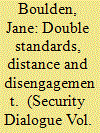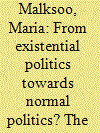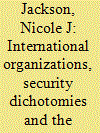|
|
|
Sort Order |
|
|
|
Items / Page
|
|
|
|
|
|
|
| Srl | Item |
| 1 |
ID:
075400


|
|
|
|
|
| Publication |
2006.
|
| Summary/Abstract |
The article examines three specific aspects of military operations authorized by the UN Security Council in the post-Cold War period. The trends examined respond to the following questions: Who chooses what gets on the Security Council's agenda? Who implements actions authorized by the Security Council? And what is it that they are doing? The answers reveal that it is the P-5 who control both what gets on the Security Council agenda and, importantly, what does not. In terms of carrying out Security Council activity, the post-Cold War period has generated a division of labour whereby developing states are the main providers of troops for blue-helmeted UN operations, while developed states contribute to coalition operations in their own regions and/or when their own vital interests are at stake. The main activity is post-conflict or what might be termed pre-post-conflict operations. Taken together, these trends characterize a Council that can be described as distant and disengaged, at least for some conflicts in some parts of the world. Using Claude's idea of collective legitimization, the article argues that these trends suggest that greater consideration needs to be given to how to recoup Council legitimacy, not just how to increase its representative nature, when debating UN reform. While both representativeness and legitimacy are desirable, the pursuit of one without considering the repercussions to the other may ultimately undermine the objectives of reform.
|
|
|
|
|
|
|
|
|
|
|
|
|
|
|
|
| 2 |
ID:
075394


|
|
|
|
|
| Publication |
2006.
|
| Summary/Abstract |
This article presents a critical discourse analysis of the Baltic states' self-positioning within European foreign policy. It argues that, despite certain relief in their immediate security concerns after the dual enlargement of the EU and NATO, the shift from existential politics to normal politics by the Baltic states is far from being accomplished. The way in which the countries of Central and Eastern Europe (CEE) have responded to the construction of their identity as 'Europe but not Europe' throughout the enlargement processes of the EU and NATO has been largely neglected in empirical studies on their post-Cold War self-conceptualizations in the European arena. Yet, the experience of being framed as simultaneously in Europe and not quite European has left a constitutive imprint on the current security imaginary of the Baltic states. William Connolly's concept of the politics of becoming is thus applied to analyse the Baltic version of becoming a subject in the field of common European foreign policy.
|
|
|
|
|
|
|
|
|
|
|
|
|
|
|
|
| 3 |
ID:
075398


|
|
|
|
|
| Publication |
2006.
|
| Summary/Abstract |
This article explores some of the conceptual, political and historical links between social and national security. Social security and national security are not often talked about together, despite the recent surge of interest in widening the security agenda. The first aim of this article is to contribute to critical ways of thinking security by identifying the issues connecting social and national security. The second aim is to suggest that if there is any mileage in the idea of 'securitization' as a process, its primary example may lie in the realm of social security. The third aim is to link social security and national security via the notion of economic security, bringing together themes within international political economy and security studies in an argument about the fabrication of economic order.
|
|
|
|
|
|
|
|
|
|
|
|
|
|
|
|
| 4 |
ID:
075395


|
|
|
|
|
| Publication |
2006.
|
| Summary/Abstract |
This article offers a constructive critique of the Copenhagen School's 'securitization' framework by applying it in an analysis of the role of international organizations seeking to counter the trafficking of narcotics and persons in post-Soviet Central Asia. The study discovers common and divergent motivations that explain international attempts and failures to securitize. In the case of human trafficking, significant clashes created obstacles to international efforts. In both cases, international organizations advanced their agendas through the language of security, but also through institutional changes and increased resource allocation. These processes led to the adoption of mostly traditional security strategies. The analysis concludes that although the securitization framework makes significant contributions as an analytical tool, its definition is too vague and it is too narrow in focus. 'Security dichotomies' need to be taken into account in a comprehensive analysis of why international attempts to securitize issues sometimes succeed and sometimes fail. The influence of rhetoric on the development of policy should also be taken into account if the securitization framework is to provide a complete understanding of the issues or be useful for policymakers.
|
|
|
|
|
|
|
|
|
|
|
|
|
|
|
|
| 5 |
ID:
075397


|
|
|
|
|
| Publication |
2006.
|
| Summary/Abstract |
The issue of security has recently gained acute relevance for theoreticians and policymakers, but the way in which culture relates to security has yet to be given the attention it deserves. This article argues that all discourses and practices of security - ours as well as those of others - are cultural in nature, are historically positioned, and therefore inescapably plural. The article uses a case study of today's revival of Buddhism in Cambodia to illustrate how an anthropological approach may be applied in order to begin challenging the inherent ethnocentricity of much security theory. It explores a particular indigenous scheme of security, and how that scheme relates to power and moral legitimacy. The way Cambodians understand and deal with danger should, it is contended, alert us to the need for social scientists and policymakers to seek culturally sensitive understandings of security. This may help us make sense of local behaviour that may seem unreasonable according to our values; it can provoke us to check and refine our theory rather than indiscriminately apply it; and it may help limit the hegemony of privileged systems of ideas and the violence these can sometimes do to disempowered systems.
|
|
|
|
|
|
|
|
|
|
|
|
|
|
|
|
| 6 |
ID:
075399


|
|
|
|
|
| Publication |
2006.
|
| Summary/Abstract |
The article surveys the responses to the European Security and Defence Policy (ESDP) of two important external actors: the United States and Russia. It explains the motivations behind these responses and the effect of the latter on the development of the ESDP. The survey finds that both the Clinton and the Bush administrations in the USA have expressed cautious support for the initiative while insisting on NATO's salience in Europe. Russia's enthusiasm for the project is an effort to ensure its participation in European and global security affairs. The conclusion of the article briefly explores the implications of the empirical observations in the light of the future development of the ESDP.
|
|
|
|
|
|
|
|
|
|
|
|
|
|
|
|
| 7 |
ID:
075396


|
|
|
|
|
| Publication |
2006.
|
| Summary/Abstract |
Wartime sexual violence continues to be widespread and systematic in contemporary conflicts. Although the problem is gaining increasing international attention, it has remained, for the most part, peripheral within the domain of security studies. However, the human security agenda may have the capacity to raise the profile of wartime sexual violence and offer a useful framework from which to understand and respond to the unique needs of war-affected girls and women. This article explores the capacity of the human security agenda, both conceptually and practically, to address the plight of girl victims of sexual violence in the aftermath of Sierra Leone's conflict. Drawing upon the perspectives and experiences of three girls formerly associated with Sierra Leone's Revolutionary United Front, the article traces the extreme forms of sexual violence and insecurity girls were forced to endure, both during and following the conflict. It also examines a number of human security efforts implemented in the conflict's aftermath and their impact on the level of empowerment, protection and security of girls. The broader implications of these human security efforts are explored in light of the girls' lived realities in post-conflict Sierra Leone.
|
|
|
|
|
|
|
|
|
|
|
|
|
|
|
|
|
|
|
|
|